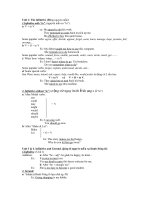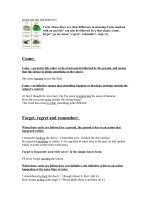GERUND OR INFINITIVE
Bạn đang xem bản rút gọn của tài liệu. Xem và tải ngay bản đầy đủ của tài liệu tại đây (78.17 KB, 3 trang )
GERUND OR INFINITIVE?
Verbs where there is a clear difference in meaning:Verbs marked
with an asterisk* can also be followed by a that-clause: come ,
forget*, go on, mean*, regret*, remember*, stop, try
Come:
Come + gerund is like other verbs of movement followed by the gerund, and means
that the subject is doing something as they move:
She came running across the field.
Come + to-infinitive means that something happens or develops, perhaps outside the
subject's control:
At first I thought he was crazy, but I've come to appreciate his sense of humour.
How did you come to be outside the wrong house?
This word has come to mean something quite different.
Forget, regret and remember:
When these verbs are followed by a gerund, the gerund refers to an action that
happened earlier:
I remember locking the door (= I remember now, I locked the door earlier)
He regretted speaking so rudely. (= he regretted at some time in the past, he had spoken
rudely at some earlier time in the past.)
Forget is frequently used with 'never' in the simple future form:
I'll never forget meeting the Queen.
When these verbs are followed by a to-infinitive, the infinitive refers to an action
happening at the same time, or later:
I remembered to lock the door (= I thought about it, then I did it.)
Don't forget to buy some eggs! (= Please think about it and then do it.)
We regret to announce the late arrival of the 12.45 from Paddington. (= We feel sorry
before we tell you this bad news.)
Go on:
Go on + gerund means to continue with an action:
He went on speaking for two hours.
I can't go on working like this - I'm exhausted.
Go on + to-infinitive means to do the next action, which is often the next stage in a
process:
After introducing her proposal, she went on to explain the benefits for the company.
John Smith worked in local government for five years, then went on to become a Member
of Parliament.
Mean:
Mean + gerund expresses what the result of an action will be, or what will be
necessary:
If you take that job in London it will mean travelling for two hours every day.
We could take the ferry to France, but that will mean spending a night in a hotel.
Mean + to-infinitive expresses an intention or a plan:
Did you mean to dial this number?
I mean to finish this job by the end of the week!
Sorry - I didn't mean to hurt you.
Stop:
Stop + gerund means to finish an action in progress:
I stopped working for them because the wages were so low.
Stop tickling me!
Stop + to-infinitive means to interrupt an activity in order to do something else, so
the infinitive is used to express a purpose:
I stopped to have lunch. (= I was working, or travelling, and I interrupted what I was
doing in order to eat.)
It's difficult to concentrate on what you are doing if you have to stop to answer the phone
every five minutes.
Try:
Try + gerund means to experiment with an action that might be a solution to your
problem.
If you have problems sleeping, you could try doing some yoga before you go to bed, or
you could try drinking some warm milk.
'I can't get in touch with Carl.' 'Have you tried e-mailing him?'
Try + to-infinitive means to make an effort to do something. It may be something
very difficult or even impossible:
The surgeons tried to save his life but he died on the operating table.
We'll try to phone at 6 o'clock, but it might be hard to find a public telephone.
Elephants and mice have to try to live together in harmony.
Pham Ha (Theo Internet)









